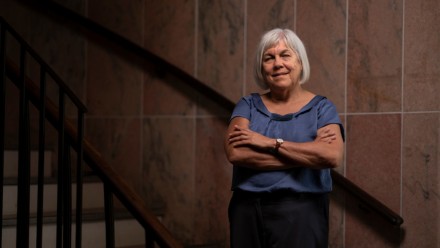Honours highlight First Nations justice reform
Share
Dr Jill Guthrie has been given one of Australia's highest honours for significant service to Indigenous health, including her work on reducing Aboriginal and Torres Strait Islander contact with the criminal justice system.
Dr Guthrie, a descendant of the Wiradjuri people of Western NSW, was one of three academics from The Australian National University (ANU) who have been appointed a member of the Order of Australia (AM) in this year's Australian honours.
Dr Guthrie, who has worked on Aboriginal and Torres Strait Islander health outcomes for over 30 years, said it was "a wonderful honour to be recognised".
Dr Guthrie's work has led the way in crafting innovative evidence-based approaches to criminal justice that prioritise the health of Aboriginal and Torres Strait Islander people and their communities.
The epidemiologist recently led a justice reinvestment project in her hometown of Cowra which redirects funds from prisons to holistic initiatives and services to address the causes of offending and keep those at risk of incarceration from coming into contact with the criminal justice system.
"Many talented and dedicated people contribute to my work and deserve to be celebrated, including my mentors, collaborators, funders, and the Cowra community who are working with us to inform and advance justice reinvestment research," Dr Guthrie said.
"The Cowra community have done the hard work in developing an understanding of justice reinvestment and how it will help them."
"I hope this award helps to push our efforts along faster."
Professor Banks' collaborative research on breast cancer and menopausal hormone replacement therapy (HRT) contributed to shifts in prescription policy in the United Kingdom and Australia and reductions in cancer rates.

"Public health and epidemiology are the ultimate team sports," Professor Banks said.
"They include the millions of people willing to share information about their health, mentors, funders and institutions who have supported me, and my colleagues and tireless team members."
Professor Banks' tobacco research has provided evidence to support significant action including legislation to increase tobacco tax rates, better information for people trying to quit, and anti-smoking campaigns.
Professor Banks and her team have also been an influential public health research group for Australia's COVID-19 response.
They provided evidence and design for Australia and New Zealand's COVID-19 surveillance systems, and spearheaded amendments to contact tracing methods.
"I think people have a whole new appreciation of public health due to COVID-19," Professor Banks said.
"Done properly, public health has protected the whole population, including the medical frontline. These are unique skills, and it's not intuitive - these are skills that are developed over a lifetime."
“I’m truly proud of the immense contribution that Jill, Emily, and their teams have made to improve the health of people everywhere. Their work with Aboriginal and Torres Strait Islander peoples and their passionate advocacy empower and inspire us all,” says Professor Lyndall Strazdins, RSPH Director.
Professor Russel Gruen, Dean of the College of Health and Medicine, also congratulates Dr Guthrie and Professor Banks, “Both Emily and Jill will be humbled by this award. While it is the collective work of their teams, it takes their own distinctive and engaging type of leadership to make a difference. In all that they have achieved, we are very proud that they are distinguished leaders at ANU.”











